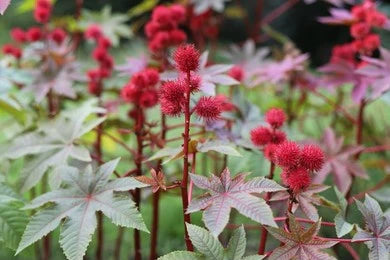Ricinus is an evergreen, herbaceous, and semi-woody big shrub that grows quickly. It can reach heights of up to 5 meters and a width of 4.5 meters. The glossy, palmate leaves range in color from green to purple, with 5–11 deeply carved lobes, and have long petioles. The hollow nodes in the stems range in color from green to crimson. Female flowers are egg-shaped capsules that are reddish brown and heavily covered in soft, flexible spines. Male flowers are on the lower spike of the flower and have yellow anthers. Three seeds that resemble fat, bloated, and fatally poisonous with brownish mottling are included in each capsule.
General information
Ricinus is also known as the hand of Christ, the castor bean plant, and the original castor oil plant. Hindi names for castor include Eranda and Gandharav Hasta. Due to its therapeutic qualities, it is employed in many Ayurvedic medicine treatments. One of the potent laxatives is ricinus. This plant is dangerous in all of its parts, but its seeds carry the poison ricin. It is the finest treatment for constipation and teeth problems. Rheumatism patients can benefit greatly from castor seed oil. It is a widely used medicine for treating children's diseases.
Purification of Castor seeds
Ricinus seeds are extremely poisonous, and they must be fomented in coconut water for three hours to purify them. These seeds are then cleaned and dried to be used in the creation of medications.
Special note about Castor
Due to the presence of the chemical compound ricin, the seeds of this plant are extremely poisonous. It is the plant that is most lethal on Earth. A lethal dose for people is thought to be between 5 and 10 seeds. An overdose may result in abrupt death as well as symptoms such as nausea, vomiting, diarrhea, hypotension, tachycardia, and seizures. The onset of symptoms could be 2-4 hours away or it could take up to 36 hours. Additionally, ricin is utilized to make a variety of herbicides and insecticides.
Habitat
The Middle East and northeastern Africa are the original habitats of this plant. Later, it spreads like a weed throughout all tropical and subtropical areas of the earth. It mainly grows on the boundaries of cultivated lands, in waste farms, and on steep hillsides.
Classification
- Kingdom - Plantae
- Order - Malpighiales
- Family - Euphorbiacaeae
Names
- Latin Name - Ricinus Communis
- Hindi Name - Erand, Redi, Erend
- English Name - African Coffee Tree, Arandi, Castor
- Bengali Name - Rehri, Bhairenda
- Telugu Name - Amudamu
- Bengali Name - Bherenda, Rehri, Bhaerand
- Tamil Name - Amanakku, Amanakkam
- Marathi Name - Erandi
- Malayalam Name - Avanakku
- Gujarati Name - Diveligo, Diveli Erandi
- Kannada Name - Haralu, Manda
- Farsi Name - Bed Anjeer
- Arabian Name - Khirva
- Assam Name - Eri
- Nepali Name - Areta, Orer
- Punjabi Name - Aneru, Arand
- Chinese Name - Pee - Ma
- Egyptian Name - Kiki
- Sinhala Name - Endaru
- Persian Name - Ved Anjir
Ayurvedic Properties
|
|
Hindi / Sanskrit |
English |
|
Rasa (Taste) |
Madhur, Katu, Kashaya |
Sweet, Pungent, Astringent |
|
Guna (Physical Property) |
Snigdha, Sookashma, Teekshna |
Unctuous, Minute, Sharp |
|
Virya (Potency) |
Ushna |
Hot |
|
Vipaka (Post-Digestive Taste) |
Madhura |
Sweet |
Effects on Doshas
It balances Vata and Kapha doshas.
|
Charak Samhita |
Sushrut Samhita |
|
Vidarigandhadi, Adhobhaghara, vata sanshamana |
Rajnighantu
According to Rajnighantu, there are two types of Castor:
- Shweta Castor (White Ricinus)
- Rakta Castor (Red Ricinus)
Practical uses Castor
- Since ancient times, rheumatism, worm infestation, severe constipation, and stomach ailments have all been treated using castor seeds and seed oil.
- This ayurvedic skin care product, an oil, is used to treat a variety of skin disorders, including boils, furuncles, and other skin problems
- It is used to treat diseases like arthritis and facial paralysis that are associated with the vata dosha.
- This plant works as a diuretic and is particularly successful in treating dysuria, urine retention, and various infections of the urinary system in both men and women.
- To enhance the flow of milk, nursing moms locally massage castor oil over their breasts.
- The daily use of this herb's seed oil helps to lessen dandruff and encourage the growth of new hair.
- This herb's root bark is emetic and purgative. A decoction of the leaves is extremely good for those suffering from lumbago and sciatica.
- Castor seeds are also used to prevent pregnancy.
Parts used
- Roots
- Leaves
- Fruits
- Seeds
Dosage
- Seed oil : 3-5 drops
- Powder: 1-3gm

